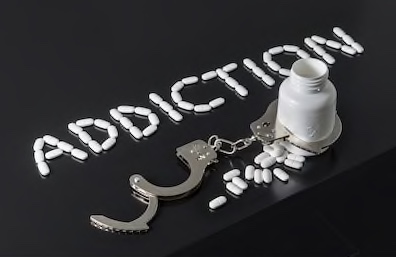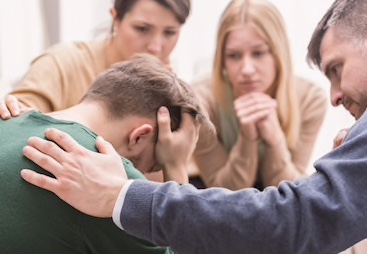
More people are addicted to opiate painkillers and heroin than ever before in history. In 2016, there was an estimated 65,000 fatal overdoses in the United States alone and that number has been rising and will continue to rise until we take on a different approach to opiate addiction.
So what do you do when someone you love is addicted to opiates?
More often than not, the addict knows that he or she needs help along with everyone else around that person.
Unfortunately, withdrawal is what keeps most opiate addicts using. The painful effects of withdrawal were what kept me using even after I knew that I was done because I didn’t want to do another shitty detox.
People assume that once an addict enters treatment, that they will be treated well and effectively but that’s not always the case. I was so sick throughout my entire last detox that I knew I could have done it better myself at home (I felt I had access to the medications I needed). More than HALF of the patients in that last detox left without completing treatment because they weren’t getting treated appropriately….some not treated at all. Part of me felt that this particular detox & rehab intentionally under medicated their patients so that they would be so uncomfortable that they would never want to relapse and have to go through it ever again. NOT THE RIGHT APPROACH. These were all people who wanted to get help. I came in sick in the morning and was left sick and incredibly uncomfortable until midnight…unacceptable.
When bringing up treatment options, it helps to well informed and open to a variety of treatment modalities.
Rehab is not the only solution.
In fact, it’s worth noting here that the success rates in rehabs are actually pretty terrible. There is about a 15% success rate with rehab and that’s being generous and going with the “successful” studies.

For me, Medication Assisted Treatment (MAT) is what worked. This form of treatment actually has the highest success rates out of any other treatment out there. Now that there is science and data supporting this form of treatment, it’s becoming more socially acceptable and more doctors and even rehabs are using it. MAT is truly an effective treatment that your loved one may actually be open to with success rates around 85-90%.
I’ve said it before but it’s worth saying again, most addicts will continue to use until they reach their rock bottom and know that they are done.
The best thing you can do is to offer support. Cutting an addict off and out of your life will only hurt them more. However, there is a delicate line when it comes to suppport versus enabling. To be clear, offering support to your loved one does not mean enabling their behavior. You can set your boundaries while continuing to offer the support your loved one needs and continuing to encourage treatment.
Its not uncommon to feel unsure about what to say or how to say it when you have a loved one who is battling addiction.
When discussing treatment options, try to avoid negative dialogue that will make your loved one feel judged. Focus on how much you care about your loved one and that you are bringing up the topic out of love and concern.
For me, what pushed me away further from my loved ones were the hurtful comments that some people made. I had a cousin tell me that he didn’t believe that I got robbed…he said it a easier to believe that I sold all of my shit to get more drugs which hurt me and pushed me away from him even more. Avoid making judgements or blaming your loved one for their addiction. That will almost guarantee doing more harm than good and will likely push your loved one away.
Another thing to avoid doing is making public comments on social media or any other public platform. I had two people do this to me on Facebook which I found devastating because it led to everyone finding out about my drug problem…from the kids I used to nanny for to former coworkers and classmates. I was beyond devastated and it actually pushed me deeper into my use due to the negative emotions that were caused by their actions. Addiction can be very isolating and there is a lot of stigma that comes with it. Try to avoid adding to that isolation by saying or doing hurtful things that will push your loved one away even further.

Dont try to force your loved one into treatment because more likely than not treatment will fail if your loved one isn’t ready.
How many times have you seen that show, Intervention, where it turned out with long lasting, positive results? Ambushing your loved one and forcing your loved one into a program when they are not ready usually fails over the long term.

What finally did work when I was ready to quit was knowing that I had the love and support from the people I needed most at that time.
By making it clear that you love them no matter what and that you will do what you can to help them through the struggle against their opiate addiction, you are establishing a trust in the relationship that they may not have realized was there.

What is Mefication Assisted Treatment (MAT)? And sometimes the addict is cut out of peoples’ lives in order to protect the people. It might not be that “tough love” is being applied it is just that some people have to protect what is theirs and that means not having the addict and those s/he brings around in one’s life. The whole situation is just sad. So sad. It hurts everyone. Glad you got the help you needed.
LikeLike
Thank you for you comment and feedback!
MAT stands for Medication Assisted Therapy. Traditionally, medications like methadone were used but unfortunately there was no way to prevent an addict from still getting high or possibly abusing that medication. Now, there are other options that discourage drug use while the addict is on them such as Suboxone or Vivitrol. Essentially those medications allow the addict to get off of the harmful drugs that they are on so that they can feel normal (just like any other person on the street) and without having to go through the nasty withdrawal.
Once a person “gets their life back”, they work with their physician to taper off of that medication in a safe & controlled way that minimizes withdrawl of whatever medication they were on with their treatment. MAT has very high success rates (85-90%) & I would recommend looking into it if you do know someone who is struggling with an opiate addiction. I have another posting called “How Rehab May Kill You” which explains MAT in much greater detail.
I agree that it is a very sad situation for everyone involved. Loved ones are often hurt which is why boundaries are so important when dealing with addiction. Best of luck to you.
LikeLike
Thanks, I was in a situation decades ago. I was just trying to explain why sometimes it is necessary for people to cut people out of their lives. Sometimes there is too much to lose so it is sad that the harsh action has to be taken. Thank you for the MAT info.
LikeLike
I’m glad you are no longer in that situation!
Yes, I can see why some people need to cut addicts out of their lives. Thankfully, my friends and family never did that to me…I also never crossed the line of stealing from anyone I knew or doing things that would hurt them. However, I could see how it would be too painful to watch someone you love be involved with that vicious cycle of addiction.
Now that I’m no longer “in it”, I could see how it could cause too much pain to watch a loved one self destruct. It’s a very dangerous addiction and lifestyle 😢
I know many people still involved that I wish I could help, but I just know they aren’t there yet. The rest of the users I met while I was in that lifestyle I had to cut out of my life for the sake of my own sobriety…so sad that its so devastating and hurtful to almost everyone involved.
LikeLike
The stealing and for some, the scary people that they become involved with and bringing those people to your home . . . not acceptable. See? You, yourself have reasons why you had to cut people out of your life. It is sad, but sometimes it is necessary.
It is so sad because so often the addict is a great person but their addiction makes them not so or has them doing things or putting themselves and others in situation that are not safe. Again, glad you got help and you are not longer “in it”.
LikeLike